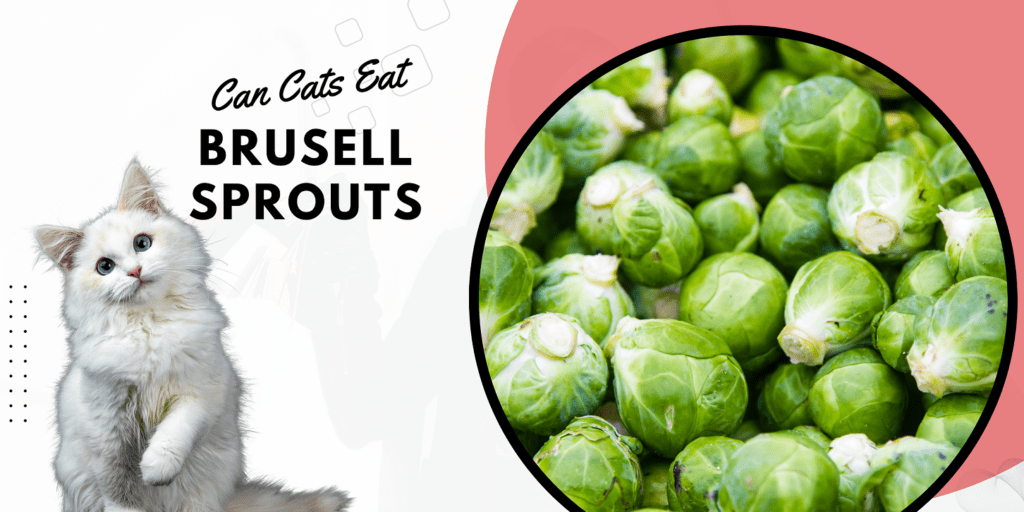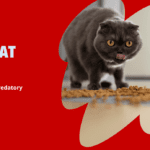When it comes to eating, cats are very inquisitive. If you’re a cat owner, you might question if it’s okay to feed your cat table scraps. Brussels sprouts are one food that people have a lot of questions about. These little cabbages are nutritious powerhouses, but can cats eat them? This article will investigate whether or not brussels sprouts are safe for cats to eat, and will go over the potential benefits and drawbacks of giving your cat this vegetable.

Nutritional Value of Brussel Sprouts
The vitamin content of brussels sprouts is high, making them a healthy food choice. Vitamins C, K, and A, as well as minerals including folate and potassium, can be found in them. Brussels sprouts are a favorite of the health-conscious because of their high fiber and antioxidant content. Cats, on the other hand, have specific dietary needs that differ from those of humans.
Cats and Vitamin C
Cats, unlike humans, can make their own vitamin C, therefore they don’t need to get it from food. Although brussels sprouts are a good source of vitamin C, you can acquire all the vitamin C your cat needs from other foods.
Cats and Vitamin K
Vitamin K is a must-have for feline diets since it aids in blood coagulation. Even a modest amount of brussels sprouts can boost the vitamin K levels in your cat’s diet. However, it’s crucial to note that giving your cat an excessive amount of vitamin K can counteract the effects of drugs like anticoagulants. Before giving your cat any new meals, check with your vet first.
Fiber and Antioxidants
Due to its high fiber content, brussels sprouts can help cats with digestive problems and constipation. The fiber helps in digestion and keeps your bowels regular. Moreover, the antioxidants in brussels sprouts can help strengthen the immune system and provide additional defense against illness. If you want to keep your cat’s digestive system happy, introduce fiber-rich meals slowly and in moderation.
Potential Risks for Cats
While there may be nutritional benefits to giving your cat brussels sprouts, there are also some dangers to be aware of.
Digestive Upset
Due to their delicate digestive systems, cats can experience gastrointestinal distress from abrupt dietary changes, which can manifest as diarrhea and vomiting. If not introduced gradually and carefully, brussels sprouts can cause stomach problems in cats. It’s best to introduce your cat to new foods in small amounts and monitor its reaction before increasing the serving size.
Gas and Bloating
Some people, including humans, experience uncomfortable gas and bloating after eating brussels sprouts. The same thing is true with cats. If your cat develops gas or bloating after eating brussels sprouts, you should stop giving them to them and see a physician.
Allergic Reactions
Even though it doesn’t happen often, some cats can acquire an allergy to brussels sprouts and other foods. Stop giving brussels sprouts immediately if you discover signs of an allergic response, such itching, swelling, or trouble breathing, and consult a vet right away.
How to Safely Feed Brussel Sprouts to Cats
- If you want to try feeding your cat brussels sprouts, make sure you do it in a controlled environment. To make sure your cat stays healthy, adhere to these rules:
- Step 1: Get your vet’s approval before feeding your cat anything new. Based on your cat’s unique health history and nutritional requirements, they can provide you tailored recommendations.
- Cook Brussel Sprouts the Right Way: Thoroughly rinse the brussels sprouts and discard any wilted or damaged outer leaves. Prepare the brussels sprouts by steaming or boiling them until they can be mashed easily. Seasonings, oils, and butter can be hazardous to cats, so don’t use them.
- Third, start by giving your cat a tiny bit of mashed brussels sprouts. Keep an eye out for any signs of gastrointestinal distress or allergic reactions as a result of their reaction. If your cat eats brussels sprouts and seems to enjoy them, you can increase their serving size over time.
- While brussels sprouts may be healthy for your cat, they should only make up a tiny portion of their diet. High-quality cat food specially prepared to fulfill the nutritional demands of cats should make up the bulk of a cat’s diet.
Alternative Vegetables for Cats
There are various options that are generally safer and more acceptable for feline eating if you want to feed your cat vegetables:
- First, plain cooked pumpkin can be helpful for cats. Because of its high fiber content, it can ease digestive problems like constipation.
- Broccoli florets that have been briefly cooked are a healthy addition to your cat’s diet. However, flavorings and oils should be avoided.
- Your cat can benefit from the vitamins and minerals included in cooked carrots by feeding it mashed carrots.
Keep your cat’s reaction in mind as you progressively introduce fresh vegetables to him. Because of their individuality, cats can have varying degrees of tolerance for various meals.
Conclusion
In conclusion, although being a nutrient-dense vegetable for humans, cats do not require brussel sprouts as part of their diet. Some cats may tolerate mashed and properly prepared brussels sprouts without incident, while others may experience gastrointestinal distress, gas, bloating, or allergies if they consume even little amounts. Before giving your cat any new meals, it’s best to talk to your vet.
Cats should be fed a complete and balanced cat food diet that is tailored to their needs; occasional treats of vegetables are fine. Seek the advice of a veterinarian if you have any queries or concerns about your cat’s nutrition.
FAQs
Are brussels sprouts safe for cats to eat raw?
To answer your question, no, brussels sprouts should not be fed uncooked to cats. Cats may have trouble digesting raw brussels sprouts, which can lead to stomach problems.
What about cats, are brussels sprouts dangerous to them?
The brussels sprout plant itself is not harmful to felines. However, brussels sprouts can be dangerous for cats if prepared with seasonings, oils, or butter.
When it comes to brussels sprouts, how much can I give my cat?
Your cat’s diet should not consist almost entirely of Brussel sprouts. Try giving them a modest amount at first to see how they react. An individual cat’s nutritional requirements will vary, so it’s best to get advice from your vet on how much food to give your cat.
Can brussels sprouts cause feline urinary tract problems?
Brussels sprouts have not been shown to cause urinary problems in cats. But like any vegetable, brussels sprouts might cause changes in your urinary habits if you eat too much of them. Keep an eye on your cat’s urinary health and consult your vet if you notice any changes.
To what extent is it true that cats should not eat certain vegetables?
There are, in fact, several veggies that cats shouldn’t eat. Among these are chives, garlic, onions, and mushrooms. Before adding a new vegetable to your cat’s diet, you should do some homework and talk to your vet.
Do brussels sprouts work as part of a vegetarian or vegan diet for a cat?
Because of their specialized nutritional needs, cats are classified as obligate carnivores and can only be fed meat and other animal products. There are serious health risks associated with feeding cats a vegetarian or vegan diet. To keep your cat in tiptop shape, you should feed it a diet rich in high-quality animal protein.
If my cat is allergic to brussels sprouts, what signs should I look for?
Itching, swelling, skin rashes, vomiting, diarrhea, and trouble breathing are all symptoms of an allergic reaction in cats. Always seek the advice of your physician if you have any reason to believe your cat has developed an allergy to any food, including brussels sprouts.
Can I feed my kittens brussels sprouts?
Kittens have certain dietary requirements as they mature. Instead of introducing veggies like brussel sprouts, you should focus on giving them with a balanced food created for cats. If you want to know what to feed your kitten, it’s best to ask a vet.
When they’re frozen, can cats eat brussels sprouts?
It’s possible that cats can safely eat frozen brussels sprouts, but only if you cook or thaw them thoroughly first. Brussels sprouts are difficult to digest and may cause choking if eaten raw or partially frozen.
Where can I learn more about cat food and how it affects their health?
Talk to your vet or a veterinary nutritionist if you want specifics on how to feed your cat. They can tailor their recommendations to your cat’s unique situation, health status, and dietary preferences.
Disclaimer:
At TheCatCare.org, we take great care to ensure that the information we provide is accurate, up-to-date, and reliable. However, it’s important to note that we are not medical advisors or licensed veterinarians, and the information we provide should not be considered a substitute for professional advice.

Franky Watson is a certified pet care specialist with over 10 years of experience working with animals of all kinds. He has a degree in veterinary science and is passionate about educating pet owners on how to provide the best possible care for their furry friends. In addition to writing articles on pet care topics, Franky Watson also volunteers at local animal shelters and fosters animals in need. When he’s not caring for animals, he enjoys hiking and spending time with her own pets, including two cats.





